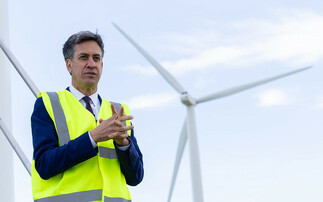
Credit: iStock
As the climate crisis proves, free market is as much of an oxymoron as definitely, maybe
I am furious at the Oasis ticketing fiasco. Not because I failed to get tickets - I was always more of a Radiohead guy - but because of the way so many of the media's usual suspects have rushed to defend Ticketmaster's right to screw over customers in the name of their self-parodying ‘free market' fundamentalism.
The libertarian house cats were out in full force over the weekend, defending Oasis' right to set its own ticket prices (no one seriously disputes this), fulminating over calls to ‘nationalise Ticketmaster' (guys, it's a joke), and decrying the idea the government may want to regulate sharp practices in the ticketing industry (just like many other governments all over the world). As one former GB News presenter and noted climate sceptic put it, it is hardly the job of government "to determine the ticket prices for the concerts of a couple of wrinkly rock stars".
The problem, as is so often the case, is that much of the performative disdain from the right wing commentariat is based on a reality-adjacent caricature of what is actually happening.
Labour is not about to tear up the principle of supply and demand and impose price controls on the live events industry. It looks pretty unlikely it will even emulate several other European countries in banning ticket resale for more than the face value. As Culture Secretary Lisa Nandy explained over the weekend, the problem was not really with the prices Oasis set for its hugely in-demand concerts, but more with the way fans were invited to queue for hours to try and secure tickets at one price only to find at the checkout that the price of those same tickets had more than doubled.
This is a pretty basic trading standards issue that any vaguely competent market inspector would shut down in minutes if it happened outside the virtual sphere. It is informative to imagine how the free market keyboard warriors would respond if their local petrol station made them queue for 20 minutes on a Saturday morning and then, just as they picked up the pump, doubled prices without warning. One suspects they would not take to social media to declare "caveat emptor".
Labour is not going to appoint some Soviet-style concert ticket price-setting board. It is likely to introduce some modest regulation to ensure consumers are provided with accurate and transparent information about the range of prices on offer before they waste time and energy trying to procure tickets. Popular acts can charge what they like and are free to set prices at a level as close as possible to what they think the market can bear. All that will be required is that pricing information is transparently available at every stage of the process, so that people who have been waiting for hours in good faith are not blindsided.
There are, as promised, a couple of climate angles contained in this low-level drama.
The first is that the so-called ‘dynamic pricing' that has prompted such ire is an increasingly important component of the energy industry. Smart or time of use tariffs promise to harness the power of market forces to better match the electricity supply and demand, ensuring renewables output is optimised and overall emissions and systems costs are reduced. They work by reducing prices during periods when there are peaks in renewables generation that exceed supply, providing a financial incentive for households to turn on their dishwasher or plug in their phone. But the flip-side of this equation is that prices can be higher during periods when renewables generation is lower, providing a financial incentive for those same households to defer turning on their dishwasher or unplug their phone.
There is nothing wrong with this and there is lots of evidence that such tariffs save individual households money and reduce the overall cost of running the energy system by curbing the need for both constraint payments to renewables generator and investment in back up power plant capacity.
But Oasis' experience highlights how you can only keep consumers on board with fluctuating prices if there is absolute clarity over the rules governing the market. There has to be a trusted and reliable system for ensuring customers are notified ahead of time when prices change, otherwise the price signal simply will not work. There may also be a need for guardrails to protect vulnerable customers from excessive increases in prices and robust regulatory oversight to ensure periods of peak demand are not used as cover for price gouging.
In fairness, the energy industry is well aware of these risks and the vast majority of smart tariffs deployed to date appear to be well managed, with smart phone technologies making it particularly easy to notify customers of any price changes. However, as the model becomes increasingly prevalent it is vital that transparency is maintained.
Secondly, far from being a perfect example of market forces in action, it could be argued the ticketing process on display this weekend is a form of market failure.
There is a live debate over whether or not Ticketmaster is a monopoly - a debate the US Department of Justice is currently seeking to resolve. But regardless of the outcome of that legal process, there is more than one form of market failure. Markets also fail when there is an asymmetry of information, and you can hardly find a better example of that than when consumers are not fully cognisant of the price of a product or the parameters within which that price can change. Making people wait for hours and then hitting them with a price hike is not a considered and rational form of price discovery. It is exploiting sunk cost fallacy and psychological impulses to generate abnormal profits.
The calls for regulation of the ticketing industry are essentially calls to correct a market failure that enables highly questionable practices. They are not dissimilar to the many calls from environmentalists for regulators to tackle what economist Lord Stern has accurately described as the biggest market failure in history. A market failure that takes in failures of information, networks, and monopolies, as well as the obvious failures to properly price polluting negative externalities and positive co-benefits.
Which brings us to those howling ‘communism' every time a government acknowledges that regulation may be required, be it to tackle carbon emissions, halt sewage spills, or ensure those who really want to see 'Champagne Supernova' performed live are not exploited. It is going to be very hard to tackle climate change and correct the market failure that drives it if media discourse regards every attempt to regulate as somehow illegitimate.
There needs to be a concerted push back against this increasingly absurd ideology and its willingness to mischaracterise its opponents at every turn. We'll never fix the biggest market failure in history if even the most modest attempts to correct obvious market failures are treated as the most egregious examples of state over-reach since the collapse of the Soviet Union.
Free market is as much of an oxymoron as definitely, maybe. As the much misrepresented Adam Smith made clear, markets only work effectively when they are regulated. It is possible to over-regulate, but it is equally possible to under-regulate. Indeed, that is one of the defining stories of the age. The climate, and Oasis fans, deserve better.
Want to understand what is going on at the cutting edge of sustainability? Check out BusinessGreen Intelligence - the premier information for professionals focused on the UK's green economy.











